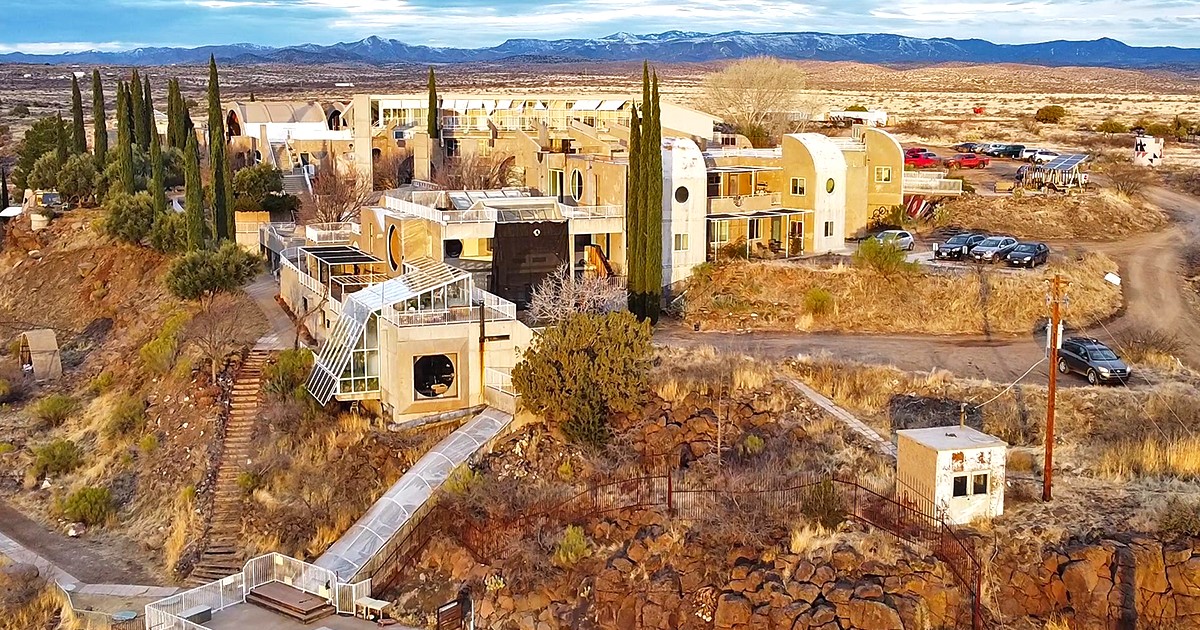Ever wondered what it’s like to hop in a DeLorean and zip through time and space?
Well, buckle up, buttercup!
We’re about to embark on an Arizona adventure that’ll make Doc Brown’s flux capacitor look like a potato clock.
1. Arcosanti (Mayer)
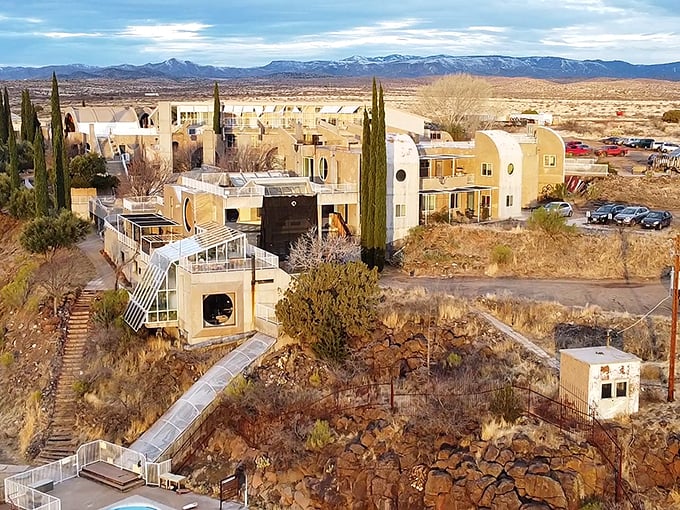

Picture this: You’re cruising through the Arizona desert, minding your own business, when suddenly – BAM! – you stumble upon what looks like a sci-fi movie set.
Welcome to Arcosanti, folks!
This architectural wonderland is the brainchild of Italian-American architect Paolo Soleri, who apparently decided that normal buildings were just too… normal.
It’s like he took a bunch of adobe structures, sprinkled them with some 1960s optimism, and voila!
Arcosanti was born.
As you wander through this urban laboratory, you’ll find yourself questioning reality.
Are those really buildings, or did someone just stack a bunch of clay pots on steroids?
The answer is yes.
To both.
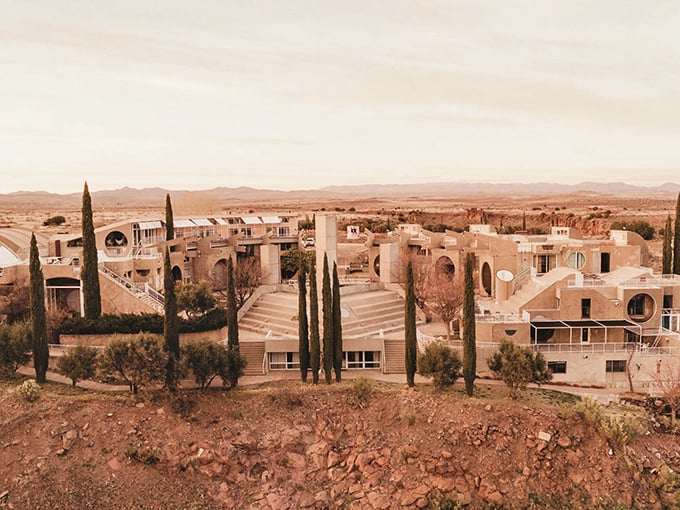

But Arcosanti isn’t just about looking cool (though it does that in spades).
It’s a living, breathing experiment in sustainable urban living.
Think of it as a hipster commune, but with better architecture and fewer drum circles.
Pro tip: If you’re feeling brave, sign up for a workshop.
You might leave with a newfound appreciation for sustainable living, or at the very least, some killer biceps from all that adobe mixing.
2. Biosphere 2 (Oracle)
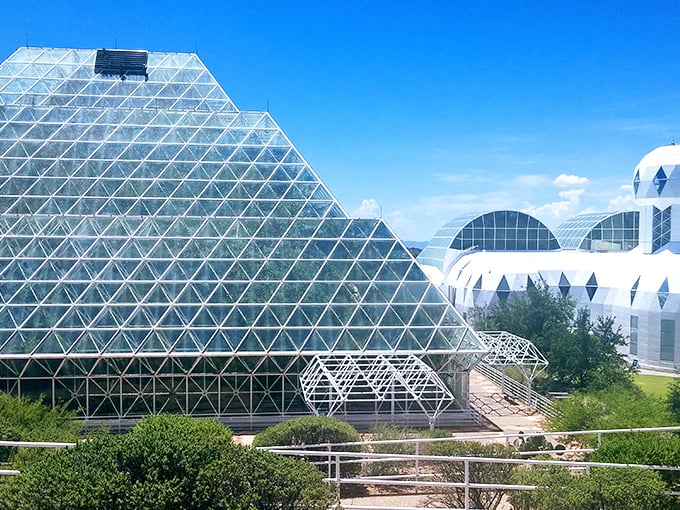

Next stop on our whirlwind tour of Arizona’s mind-benders: Biosphere 2.
No, we didn’t skip Biosphere 1 – that’s Earth, you silly goose!
Nestled in Oracle, Arizona, this massive glass-and-steel structure looks like what would happen if a greenhouse had a baby with a space station.
It’s part science experiment, part architectural marvel, and 100% guaranteed to make your Instagram followers green with envy.
Originally designed to recreate Earth’s ecosystems in a controlled environment, Biosphere 2 is now a research facility owned by the University of Arizona.
It’s like a giant terrarium, but instead of housing your sad succulent collection, it’s home to a rainforest, an ocean, and a desert.
As you tour the facility, you might find yourself wondering, “Is this where they filmed ‘Biodome’?”
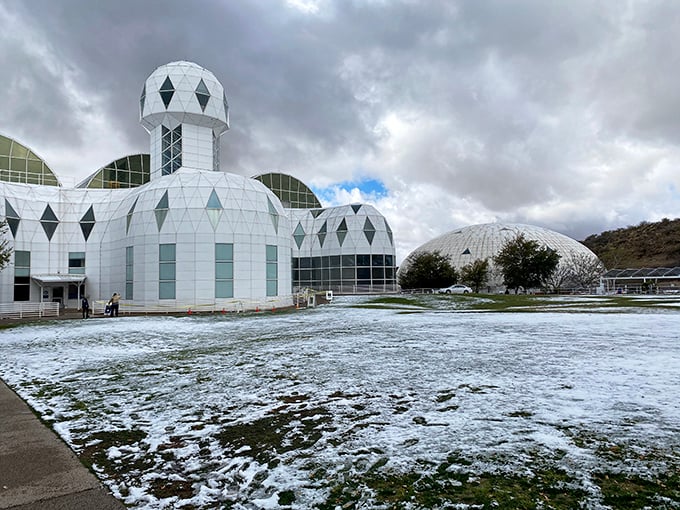

The answer is no, but kudos for remembering that cinematic masterpiece.
Fun fact: In the 1990s, eight scientists sealed themselves inside for two years.
Talk about commitment to the cause!
I can barely make it through a two-hour movie without checking my phone.
3. Lowell Observatory (Flagstaff)
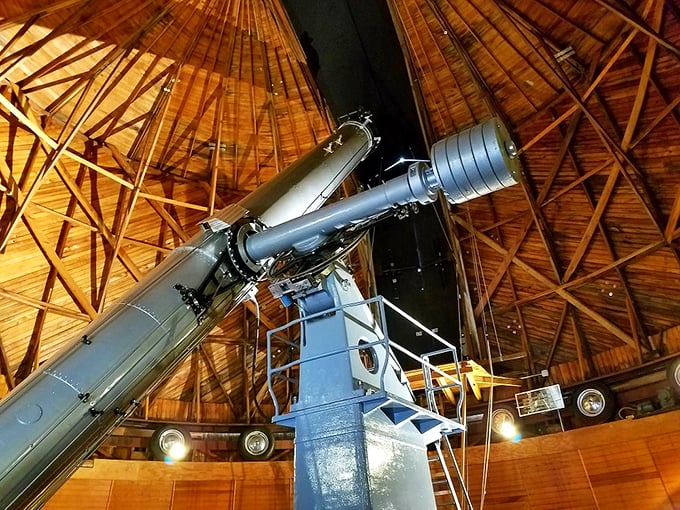

Our next stop takes us to Flagstaff, home of the Lowell Observatory.
This isn’t just any old stargazing spot – it’s where Pluto was discovered!
Yes, that Pluto.
The one we cruelly demoted from planet status.
(Still too soon?)
Founded in 1894 by Percival Lowell, this observatory is like the cool grandpa of astronomy.
It’s old, it’s wise, and it’s got some seriously impressive equipment.
The Clark Telescope, built in 1896, is still in use today.
It’s like the Keith Richards of telescopes – old, but still rocking.
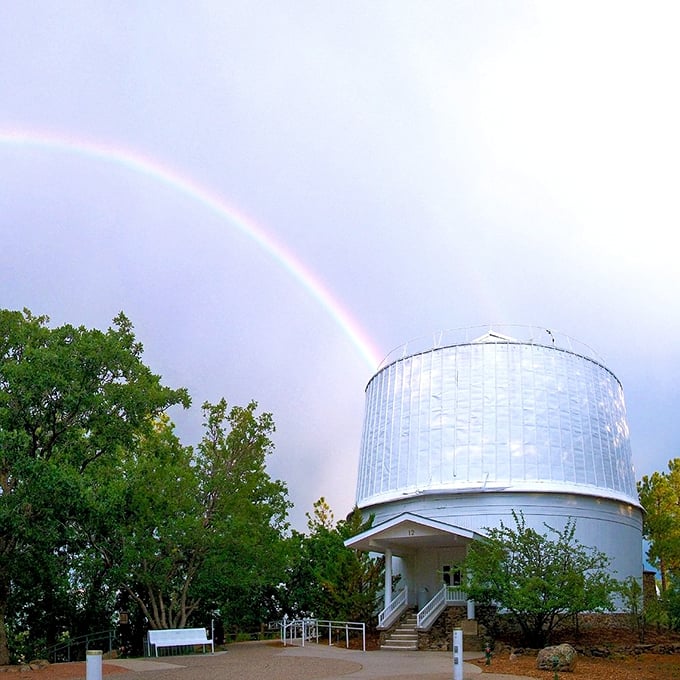

During your visit, you might get to peek through one of their high-powered telescopes.
Just remember: if you see any little green men, it’s probably just your imagination.
Or the questionable gas station sushi you had for lunch.
Pro tip: Visit at night for the full stargazing experience.
Just don’t blame us if you leave questioning your place in the universe.
Existential crises are par for the course here.
4. Pima Air & Space Museum (Tucson)
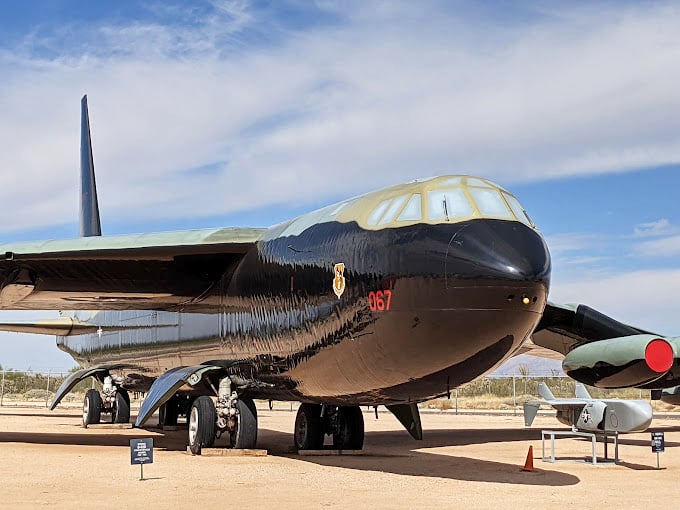

Next up on our tour of Arizona’s mind-benders: the Pima Air & Space Museum in Tucson.
This isn’t your average airplane graveyard – it’s more like a retirement community for aviation’s finest.
With over 350 aircraft spread across 80 acres, this place is heaven for aviation geeks and anyone who’s ever dreamed of being Top Gun’s Maverick.
Related: The Tiny Museum in Arizona Where You Can Relive the Glory Days of Route 66
Related: This Nostalgic Drive-in Theater in Arizona Will Transport You Straight to the 1950s
Related: This Wonderfully Quirky Rock Garden in Arizona is One of the State’s Best-Kept Secrets
(Let’s be honest, who hasn’t?)
From tiny propeller planes to massive bombers, this museum has it all.
You’ll see planes that have seen more action than a Hollywood stuntman, and others so experimental they look like they were designed by a five-year-old with an overactive imagination.
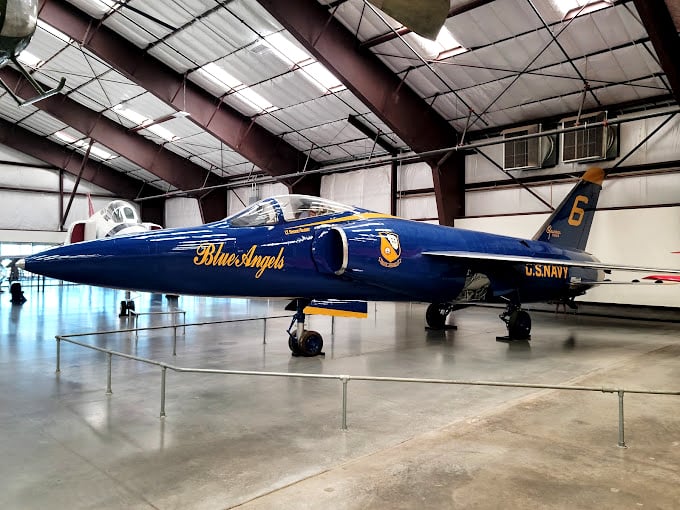

The crown jewel?
A SR-71 Blackbird, the fastest air-breathing manned aircraft ever built.
It’s so fast, it could outrun its own bullets.
Talk about a speeding ticket waiting to happen!
Pro tip: Wear comfortable shoes.
With 80 acres to cover, this isn’t the place to break in your new stilettos.
Unless you’re aiming for blisters the size of small aircraft, that is.
5. Titan Missile Museum (Green Valley)
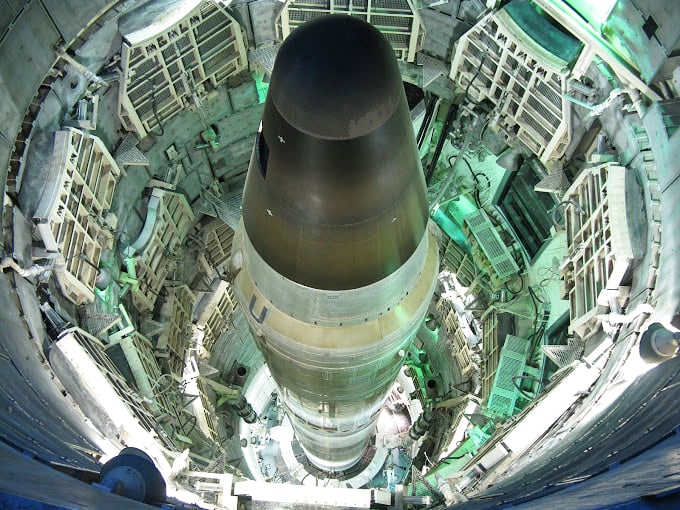

Feeling a bit too cheery after all those planes?
Time to add a dash of Cold War paranoia to our trip!
Welcome to the Titan Missile Museum in Green Valley, where you can experience the thrill of nuclear annihilation without the pesky radiation.
This decommissioned missile silo is the only publicly accessible Titan II site in the nation.
It’s like stepping into a Bond villain’s lair, minus the white cat and the elaborate death traps.
As you descend 35 feet underground into the launch control center, you might feel a chill that has nothing to do with the air conditioning.
This is where crews stood ready to launch a nuclear missile at a moment’s notice.
Talk about a high-pressure job!
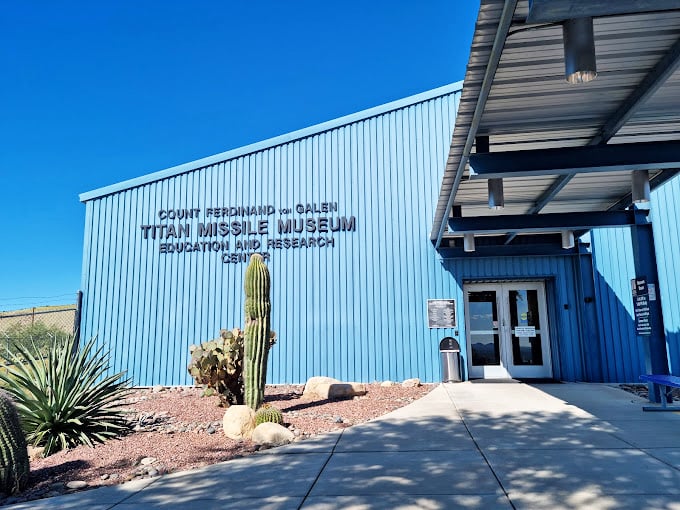

The tour culminates with a simulated launch sequence.
Don’t worry, the missile’s been deactivated.
Probably.
Maybe.
Okay, I’m 99% sure.
Fun fact: The Titan II could reach its target in just 30 minutes.
That’s faster than most pizza deliveries!
6. Meteor Crater (Winslow)
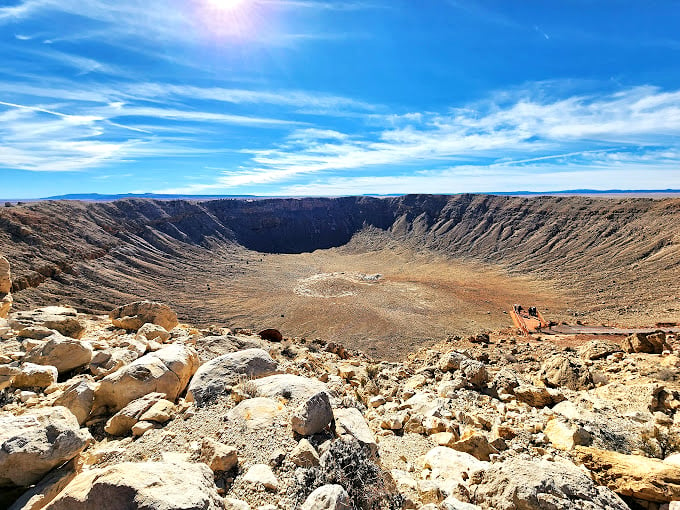

Our penultimate stop takes us to Winslow, home of the aptly named Meteor Crater.
This massive hole in the ground is what happens when Earth has a run-in with a 150-foot wide space rock traveling at 26,000 miles per hour.
Ouch!
Created about 50,000 years ago, this crater is nearly a mile wide and 550 feet deep.
It’s like Mother Nature decided to play a cosmic game of darts, and Earth was the bullseye.
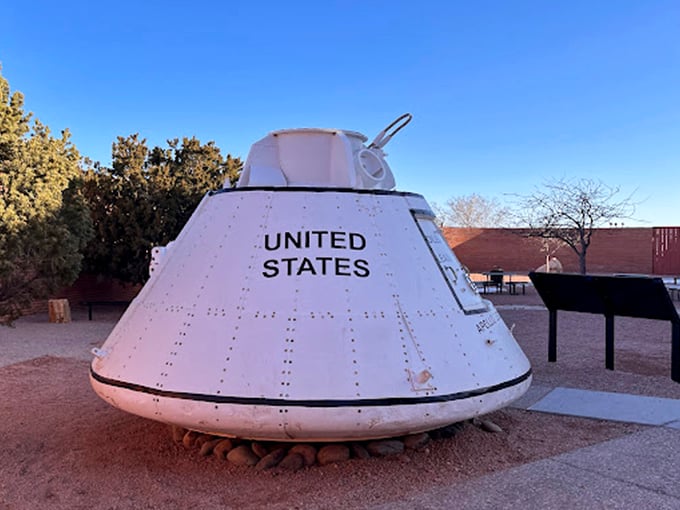

As you stand on the rim, gazing into this enormous divot, you might find yourself pondering life’s big questions.
Like, “What if this happened today?” or “I wonder if aliens use this as a landing pad?”
Pro tip: Bring a jacket.
It can get windy up there, and nobody wants to see you do an impromptu Mary Poppins impression off the crater rim.
7. ASU Mars Space Flight Facility (Tempe)
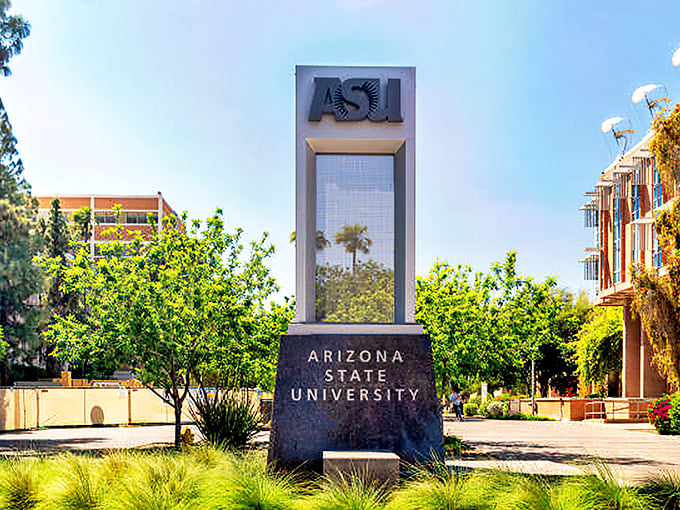

Our final stop brings us back to civilization – sort of.
We’re heading to the ASU Mars Space Flight Facility in Tempe, where Earth and Mars collide (metaphorically, of course).
This isn’t just any old university lab – it’s Mission Control for several Mars missions.
It’s where scientists pore over data and images from the Red Planet, probably while debating whether Matt Damon could really grow potatoes up there.
During your visit, you might get to see real-time data coming in from Mars.
It’s like interplanetary FaceTime, minus the awkward small talk and frozen screens.
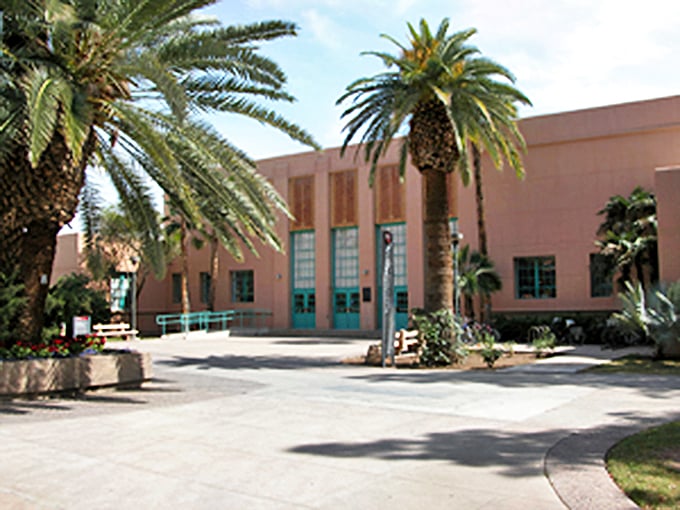

The facility also houses a full-size model of the Mars Rover.
It’s like a cosmic Roomba, but with better cameras and fewer dust bunnies to chase.
Pro tip: Bring your burning Mars questions.
The scientists here have heard it all, from “Is there life on Mars?” to “Can I buy real estate there?”
(The answers are “Maybe” and “Not yet,” respectively.)
And there you have it, folks!
Seven mind-bending Arizona attractions that’ll make you question reality, marvel at human ingenuity, and possibly develop a slight fear of meteors.
Let the journey unfold!
This map is your guide to every twist, turn, and unforgettable stop ahead.
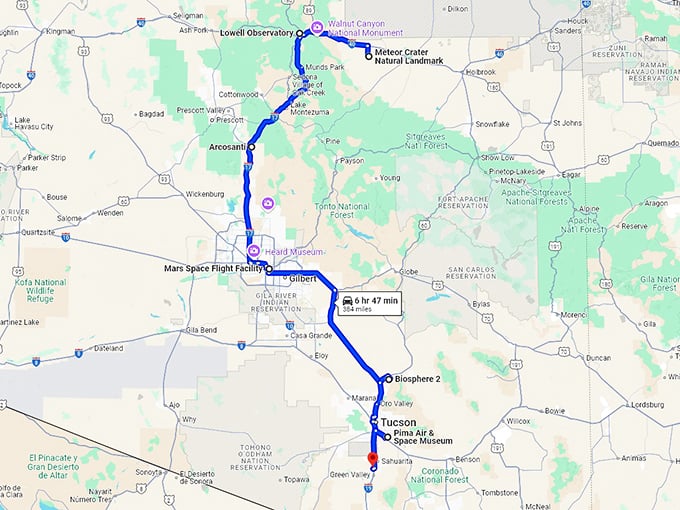

Now go forth and explore – the truth is out there!
